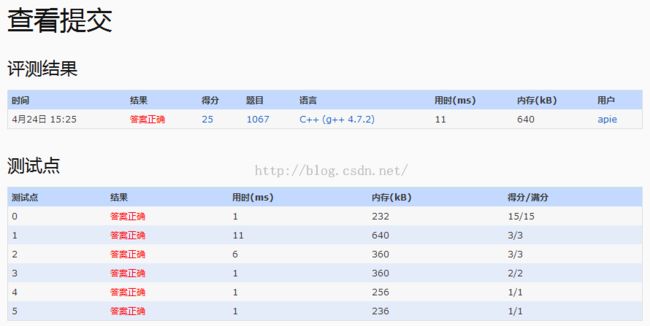1067. Sort with Swap(0,*) (25)
Given any permutation of the numbers {0, 1, 2,..., N-1}, it is easy to sort them in increasing order. But what if Swap(0, *) is the ONLY operation that is allowed to use? For example, to sort {4, 0, 2, 1, 3} we may apply the swap operations in the following way:
Swap(0, 1) => {4, 1, 2, 0, 3}
Swap(0, 3) => {4, 1, 2, 3, 0}
Swap(0, 4) => {0, 1, 2, 3, 4}
Now you are asked to find the minimum number of swaps need to sort the given permutation of the first N nonnegative integers.
Input Specification:
Each input file contains one test case, which gives a positive N (<=105) followed by a permutation sequence of {0, 1, ..., N-1}. All the numbers in a line are separated by a space.
Output Specification:
For each case, simply print in a line the minimum number of swaps need to sort the given permutation.
Sample Input:10 3 5 7 2 6 4 9 0 8 1Sample Output:
9
1),它在正确的位置,那么不用动
#include<stdio.h>
int main(void){
freopen("F://Temp/input.txt", "r", stdin);
int n;
scanf("%d", &n);
int *input = new int[n];
for (int i = 0; i < n; i++){
scanf("%d", (input + i));
}
int count = 0;
bool flag = false;
if (*input == 0)flag = true;//flag表示第一位是不是0
int group_num = 0;//组数目
for (int i = 0; i < n; i++){
bool newGroup = false;
while (*(input + i) != i){
newGroup = true;
int tmp = *(input + *(input + i));
*(input + *(input + i)) = *(input + i);
*(input + i) = tmp;
count++;
}
if (newGroup)group_num++;
}
if (flag)count += group_num * 2;
else{
count += (group_num - 1) * 2;
}
printf("%d\n", count);
return 0;
}
